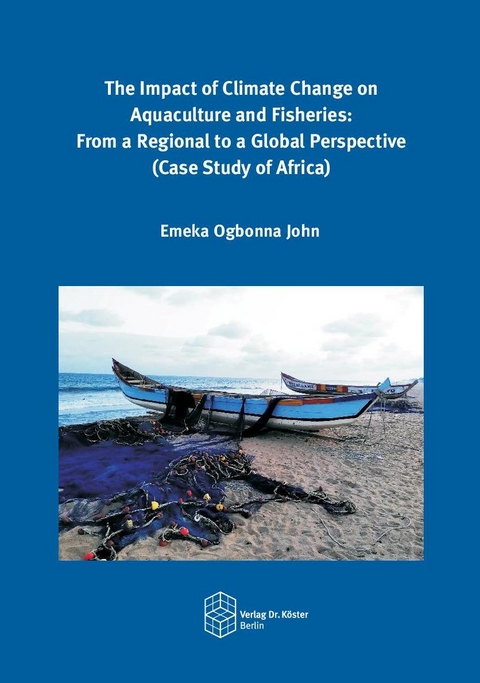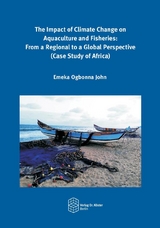The Impact of Climate Change on Aquaculture and Fisheries:
From a Regional to a Global Perspective (Case Study of Africa)
Seiten
Understanding the relationship between fisheries livelihood vulnerability, species distributions, biodiversity, marine habitats, and climate change is necessary for the design of an effective conservation management, such as in the implementation of marine protected areas (MPA), while addressing food security and livelihood of fish farmers.
The study area of this research covers a wide latitudinal range of the Africa Large Marine Ecosystem as well as selected African countries for vulnerability assessment. This area is located in seven large marine ecosystems: The Canary Current, Mediterranean Current, Guinea Current, Agulhas Current, Benguela Current, Somali Current and Red Sea Current.
Firstly, the study assessed the vulnerability of African fisheries and aquaculture to climate change impact using data generated from 27 Africa countries and secondly, explored largely available species occurrence records and environmental data with the main objectives of assessing the vulnerability of fisheries and aquaculture to climate change impact in Africa, identify the consequence of rising water temperature on marine and freshwater fish stock in Africa, and analyse the effect of climate change on fish abundance, biodiversity and fish catches in Africa.
The vulnerability assessment of 27 African countries to the impact of climate change on their fisheries sector was conducted using data generated from different sources and applying a comprehensive vulnerability assessment approach.
The study area of this research covers a wide latitudinal range of the Africa Large Marine Ecosystem as well as selected African countries for vulnerability assessment. This area is located in seven large marine ecosystems: The Canary Current, Mediterranean Current, Guinea Current, Agulhas Current, Benguela Current, Somali Current and Red Sea Current.
Firstly, the study assessed the vulnerability of African fisheries and aquaculture to climate change impact using data generated from 27 Africa countries and secondly, explored largely available species occurrence records and environmental data with the main objectives of assessing the vulnerability of fisheries and aquaculture to climate change impact in Africa, identify the consequence of rising water temperature on marine and freshwater fish stock in Africa, and analyse the effect of climate change on fish abundance, biodiversity and fish catches in Africa.
The vulnerability assessment of 27 African countries to the impact of climate change on their fisheries sector was conducted using data generated from different sources and applying a comprehensive vulnerability assessment approach.
| Erscheinungsdatum | 22.01.2023 |
|---|---|
| Reihe/Serie | Schriften zur Internationalen Agrarentwicklung ; 101 |
| Verlagsort | Berlin |
| Sprache | englisch |
| Maße | 148 x 210 mm |
| Gewicht | 234 g |
| Themenwelt | Naturwissenschaften ► Biologie ► Ökologie / Naturschutz |
| Weitere Fachgebiete ► Land- / Forstwirtschaft / Fischerei | |
| Schlagworte | Afrika • Aquakultur • Biodiversität • Fischerei • Klimawandel |
| ISBN-10 | 3-96831-031-4 / 3968310314 |
| ISBN-13 | 978-3-96831-031-2 / 9783968310312 |
| Zustand | Neuware |
| Informationen gemäß Produktsicherheitsverordnung (GPSR) | |
| Haben Sie eine Frage zum Produkt? |
Mehr entdecken
aus dem Bereich
aus dem Bereich
Grundlagen, Systeme, Anwendung, Wirtschaft
Buch | Hardcover (2024)
Carl Hanser (Verlag)
CHF 139,95




